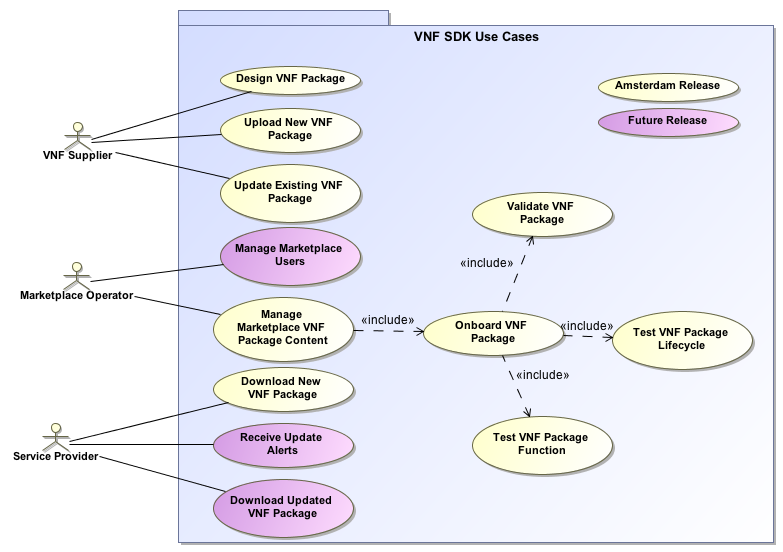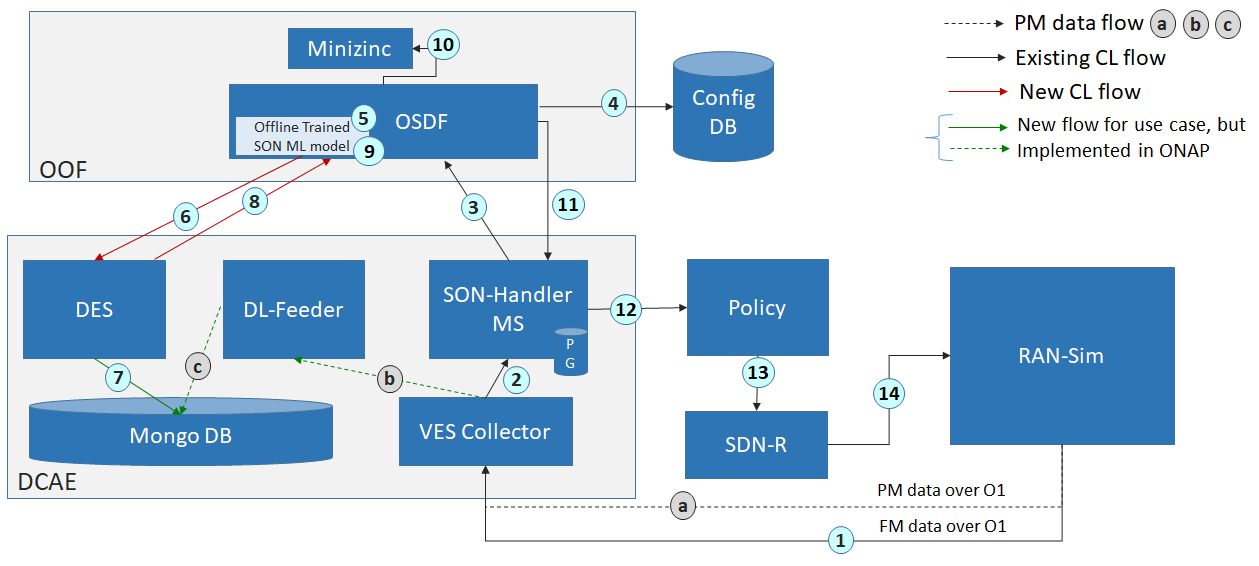Weekly Meetings: OOF-SON Meetings
USE CASE KEY INFORMATION
| USE CASE | LEAD CONTACTS / DESCRIPTION | WIKI |
| 5G OOF SON | ||
| Integration Leads | ||
| Requirement ID | Jira for the requirement | REQ-345 - Getting issue details... STATUS |
| Architecture Sub-committee Jira tracker | Architecture sub-committee presentation | ONAPARC-586 - Getting issue details... STATUS |
| Prior projects wiki link | Frankfurt Release | OOF (SON) in R5 El Alto, OOF (SON) in R6 Frankfurt |
BUSINESS DRIVER
Executive Summary
SON (Self-Organizing Networks) functionality is an essential part of existing 4G mobility networks, and will be even more critical for 5G. SON enables automation to improve network performance and efficiency, improve user experience, and reduce operational expenses and complexity. The objective of the OOF-SON (new name for OOF-PCI) use case is to develop an ONAP-based SON platform using the ONAP Optimization Framework (OOF). We have taken a phased approach since SON is complex, and SON for 5G is still evolving. We started with the Physical Cell Identity (PCI) optimization SON use case in Casablanca, then added some centralized Automated Neighbor Relations (ANR) aspects in Dublin. For Frankfurt, we will address gaps such as PCI assignment during new cell addition, alignment with RAN inventory, etc., In addition, we aim to have enhancements such as: additional optimization functionality (e.g. include the use of AI/ML), use of control loop co-ordination in Policy, and alignment with industry trends for open interfaces and open models for the RAN interactions.
Business Impact
SON is an essential feature in mobility networks, and relevant to every operator. Any ONAP-based network deployment for 5G will benefit from an ONAP-based SON solution, which provides a disaggregation of SON functions into modules aligned with the ONAP architecture. Operators and vendors will both benefit from the ability of vendors to bring best-in-class solutions to each module, while leveraging the benefits of a community-supported open platform. This will enable faster development of innovative solutions. The approach taken could very well be evolved to address SON use cases whose scope extends beyond just the RAN.
Business Markets
SON for 5G is relevant to all 5G operators and markets.
Funding/Financial Impacts
SON functions reduce Opex since the automated self-organizing functions are an efficient approach to continuously optimize network configurations to improve performance and respond to network conditions.
Organization Mgmt, Sales Strategies
There are no additional organizational management or sales strategies for this beyond whatever is required for ONAP deployment to support 5G.
Development Status
| PROJECT | PTL | User Story / Epic | Requirement |
| A&AI | No Impact | ||
| AAF | No Impact | ||
| APPC | No Impact | ||
| CLAMP | No impact | ||
| CC-SDK | Impacts deferred to Honolulu due to dependencies (see CCSDK-2392). | ||
Config DB (C&PS in Release 8) | NA | In Rel. 7, we will continue to use Config DB. SDNC-1201 - Getting issue details... STATUS has been closed. Below work will be carried out Rel. 8. Dependency. Require database solution (CRUD API, update from VES CMNotify) which is aligned to ORAN-aligned Yang model | |
| DCAE | DCAEGEN2-2257 - Getting issue details... STATUS | Modification of SON MS. Modify interface with ConfigDB/C&PS database. Test VES collector ingest of FM/PM/CM data from RAN-Sim | |
| DMaaP | No impact | ||
| External API | No Impact | ||
| MODELING | No Impact | ||
Multi-VIM / Cloud | No Impact | ||
| OOF | OPTFRA-769 - Getting issue details... STATUS | AI/ML based SON | |
| POLICY | Control loop enhancements (Stretch goal) | ||
| PORTAL | No Impact | ||
| RAN-SIM (Test Integration Demo) | Modify to use new Yang model Modify to use new CMNotify VES format | ||
| SDN-C | SDNC-1269 - Getting issue details... STATUS | Modify SDN-R code to work with new Yang model/VES format. Any minor adaptations for sending proper response to Policy for CL. | |
| SDC | No Impact | ||
| SO | No Impact | ||
| VID | No Impact | ||
| VNFRQTS | No Impact | ||
| VNF-SDK | No Impact | ||
| CDS | No impact. |
List of PTLs:Approved Projects
*Each Requirement should be tracked by its own User Story in JIRA
Links to previous Releases
The OOF and PCI use case started in Casablanca release. Please see the following links:
Base page for OOF-PCI use case: 5G - OOF (ONAP Optimization Framework) and PCI (Physical Cell ID) Optimization
Use Case template for Dublin release with Hi-level requirements: OOF-PCI Use Case - Dublin Release - ONAP based SON for PCI and ANR
Use Case page for Rel 6 (Frankfurt) and Rel 5 (El Alto): OOF (SON) in R5 El Alto, OOF (SON) in R6 Frankfurt
Use Case Diagram
Use cases define how different users interact with a system under design. Each use case represents an action that may be performed by a user (defined in UML as an Actor with a user persona).
Use Case Functional Definitions
| Section | Description |
|---|---|
Use Case Title | 5G SON |
Actors (and System Components) | The list of Actors and System Components that participate in the Use Case |
Description | Short overview of the Use Case |
Points of Contact | Authors and maintainers of the Use Case. Use Case Lead, Key Use Case members and code contributors. |
Preconditions | A list of conditions that are assumed to be true before the Use Case is invoked Includes description of Information Consumed |
Triggers / Begins when | Describes the trigger for beginning the Use Case |
Steps / Flows (success) | Describes the sequence of steps and interactions that occur during the Use Case (may include: description, data exchanges, functionality, state changes) Interaction diagrams may be included or referenced |
Post-conditions | The expected results of the execution of the Use Case Includes description of Information Produced |
Alternate / Exception Paths | Description of any exceptions or special process that could occur during Use Case |
Related Use Cases | List of the Use Cases referenced by this Use Case |
Assumptions | Describes any assumptions that are made for this use case |
Tools / References / Artifacts | List of any tools or reference material associated with this Use Case as well as any JIRA trace-ability. List of any associated diagrams or modelling artifacts associated with the Use Case |
Testing
Test Cases and Status
| # | Test Case | Status |
|---|---|---|
| 1 | SDN-R should successfully receive a CM-Notify VES message from RAN (via VES Collector) for neighbor list update, and process it (including update of ConfigDB) | DEFERRED |
| 2 | After PCI optimization, SDN-R should send a configuration update to RAN using the new 5G yang models. | DEFERRED |
| 3 | After C-ANR actions, SDN-R should send a configuration update to RAN using the new 5G yang models. | DEFERRED |
| 4 | SON-Handler MS and SDN-R to include the relevant fields in the control loop request/response messages for Policy to correlate the request and the response | NOT YET TESTED (Regression) |
| 5 | After execution of the Control Loop (CL) and getting (N)ACK from SDN-R, Policy to successfully send back the result of the CL execution (success or failue, with relevant details) to SON-Handler MS In DCAE | NOT YET TESTED (Regression) |
| 6 | When a CL is active (e.g., for PCI updates), another CL (e.g., ANR) should be successfully denied by Policy | NOT YET TESTED (Regression) |
| 7 | Successful storage of PM data reported by RAN-Sim onto Mongo DB | NOT YET TESTED |
| 8 | Define the required sql templates in DES MS that are needed for fetching PM data by OOF | NOT YET TESTED |
| 9 | When triggered for PCI optimization, OOF (OSDF) to fetch the required PM data from datalake using the DES MS API | NOT YET TESTED |
| 10 | When triggered for PCI optimization, OOF (OSDF) to employ (offline trained) ML model to update the list of cells whose PCI values should be fixed during PCI optimization | NOT YET TESTED |
End to End flow to be Tested
Step | Description |
1 | PCI collision/confusion alarm from RAN to VES collector |
2 | PCI collision/confusion alarm posted on DMaaP by VES Collector |
3 | SON-Handler triggers OOF for PCI optimization |
4 | OOF (OSDF) queries ConfigDB to obtain cells, PCI and neighbor details |
5 | OSDF invokes the ML function for any additional inputs to the optimization |
6 | ML function queries DES for PM data samples from MongoDB |
7 | DES fetches PM data samples from MongoDB |
8 | DES provides the PM data samples to ML function |
9 | ML function provides updated ‘fixed PCI cell’ list based on the ML model |
10 | Optimizer is invoked along with additional inputs from ML model |
11 | OOF returns PCI optimization result to SON-Handler MS |
12 | SON-Handler MS triggers a Control Loop towards Policy |
13 | Policy invokes SDN-R as the actor of the CL to update PCI values |
14 | SDN-R sends updated PCI values to the RAN |
Supporting Files
| Description | File |
|---|---|
| Updated slides reflecting the scope updates at M2/M3 | |
| Presentation at Use cases realization call on Jun 17, 2020 | |
| ArchCom presentation on Jun 2, 2020 | |
| Requirements Sub-Committee presentation on Mar 16, 2020 | ONAP_OOF_SON_Requirements_Subcommittee_Mar16_v_1.0.pptx |

